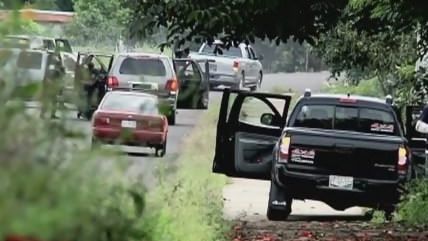"If the government doesn't back us, we must do what we can": Mexican Citizens Create Private Forces to Fight Cartels
Civilians with guns fight crime in response to police, military failures


In the face of kidnappings and extortion from cartels and a lack of reliable protection from the police and military, groups of Mexican citizens are taking matters (and weapons) into their own hands and protecting themselves. In Antúnez, Mexico, the military's efforts to restore order – or really, to restore the primacy of their own authority – by disarming the vigilantes ended in the deaths of two civilians. The New York Times notes:
Word spread quickly: The army was coming to disarm the vigilante fighters whom residents viewed as conquering heroes after they swept in and drove out a drug gang that had stolen property, extorted money and threatened to kill them. They even had to leave flowers and other offerings at a shrine to the gang's messianic leader.
Farmers locked arms with vigilantes to block the dusty two-lane road leading here. The soldiers demanded to be let in; people begged them to leave. Tempers flared, and rocks were thrown. The soldiers fired into the air, and then, residents said, into a crowd. At least two people were killed on Tuesday, officials and residents said.
"He was just a farmer, and now he died for a cause," one resident, Luis Sánchez, said of Mario Torres, 48, a lime picker who was not part of the vigilante group but was among the two buried on Wednesday as mourners cried out against the government and the soldiers.
The Times notes that following the resistance from citizen in Antúnez, officials appear to have backed down.
Fusion, a new cable network targeting American Latino millennials who speak English, produced a video report back in December interviewing several of these vigilantes talking openly about their peacekeeping efforts. Watch it here, and note the early statistic that the Mexican police solve only about 5 percent of reported crimes.
In one of these towns the vigilantes are led by a community doctor, pushed toward his activism after seeing young girls brought to him after being kidnapped and raped by cartel members. He took a dim view of the Army's efforts, telling Fusion's reporter, "They don't come here to dismantle criminal organizations. Their only mission is to protect federal roads."
Mexico has extremely strict private gun ownership laws, which is why part of the news coverage seems focused on "disarming" the vigilantes. That the military is unable to even disarm its own law-abiding citizenry (other than the gun laws anyway), and that armed citizens appear to be a better choice to keep cartels at bay (they actually have a stake in the outcome) may indicate an important shift for Mexicans in fighting the violence in their country. The New York Times frets these vigilante leaders may have ties to other criminal gangs, but there's little to indicate in either their story nor Fusion's that they are victimizing these communities further or worse than what they had been living under.
A final reminder for people in Austin, Texas, interested in Mexican drug war reporting: Reason's documentary, America's Longest War, will be screened tonight at the Alamo Drafthouse Village. Reason's Jacob Sullum will be there! More information here.


Show Comments (132)